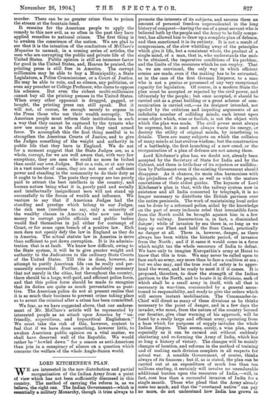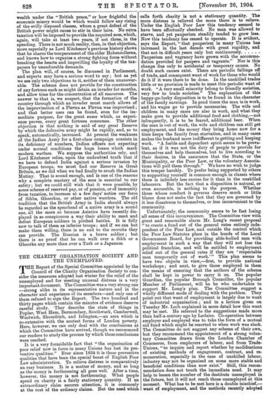V i reorganisation of the Indian Army from a point
of view which has not been sufficiently discussed in this country. The method of carrying the reform is, as we believe, the right one. The Indian. Government—which is essentially a military Monarchy, though it tries always to promote the interests of its subjects, and secures them an amount of personal freedom unprecedented in the long historyof conquest—having the use of a great servant who is believed both by the people and the Army to be fully compe- tent, has allowed him to draw up a complete plan of defence, and then sanctioned it in its entirety. It is not a result of compromises, of the slow whittling away of the principles which give it life, but a consistent whole, the product of a single mind, of a man, that is, who understands the ends to be obtained, the imperative conditions of his problem, and the limits of the resources which he can employ. That is, we are convinced, the only way in which efficient armies are made, even if the making has to be entrusted, as in the case of the first German Emperor, to a man who is not a genius or possessed of any very exceptional capacity for legislation. Of course, in a modern State the plan must be accepted or rejected by the civil power, and ultimately by the people ; but once accepted, it should be carried out as a great building or a great scheme of com- munication is carried out,—as its designer intended, not spoiled by the criticism and impeding arguments of an indefinite number of colliding minds, each intent upon some object which, wise or foolish, is not the object with which the plan was made. The civil power must always be supreme, but it need not always waste its energy, or destroy the utility of original minds, by interfering iu details. There are many subjects on which the collision of many minds at last evolves wisdom; but the construction of a battleship, the first launching of a new creed, or the reorganisation of a plan of defence are not among them.
Lord Kitchener's plan has, we doubt not, already been accepted by the Secretary of State for India and by the Cabinet, and there is little fear of its rejection or nullifica- tion by Parliament even if the existing Government should disappear. As it chances, its main idea harmonises with the prejudices of the people, as well as with the mature convictions of their ablest guides. The keynote of Lord Kitchener's plan is that, with the railway system now in existence and all India connected by telegraph, it is no longer necessary to distribute the British garrison over the entire peninsula. The work of maintaining local order can be done by a reformed police, aided by the knowledge on the part of every inchoate rebel that irresistible force from the North could be brought against him in a few days by railway. Insurrection is, in fact, a diminished danger ; while of invasion by sea there is, so long as we keep up our Fleet and hold the Suez Canal, practically no danger at all. There is, however, danger, as there always has been within the historic period, of invasion from the North ; and if it came it would come in a form which might tax the whole resources of India to defeat. We have only to imagine Kuropatkin's army at Herat to know that this is true. We may never be called upon to face such an army, any more than to face a coalition at sea ; but we also may, and the true road of safety is to appre- hend the worst, and be ready to meet it if it comes. It is proposed, therefore, to draw the strength of the Indian garrison to the North, and to locate it in divisions, each of which shall be a small army in itself, with all that is necessary in war-time, commanded by a general accus- tomed to responsibility, and ready to give the orders which will secure instant mobilisation. The Commander-in- Chief will direct as many of these divisions as he thinks necessary to the point of danger, and in a few days the invader, who must, from the nature of the country beyond our frontier, give clear warning of his approach, will be faced by a really large and efficient army, operating from a base which for purposes of supply includes the whole Indian Empire. That seems, surely, a wise plan, more especially as it can be carried out without suddenly shattering and re-forming the Army of India, which has so long a. history of victory. The changes will be mainly changes of location, and reforms in the method of training and of making each division complete in all respects for actual war. A sensible Government, of course, thinks always of its finances ; but if, as is stated, the plan can be carried out at an expenditure of much less than ten millions sterling, it certainly will involve no unendurable additional burden upon the resources of India,—will, in fact, cost less than a successful invasion of India for a single month. Those who plead that the Army already costs too much, and that the " overtaxed native " can pay no more, do not understand how India has grown in wealth under the " British peace," or how frightful the economic misery would be which would follow any rising of the evilly disposed classes, whom a great defeat of the British power might cause to stir in their lairs. No extra taxation will be imposed to provide the required sum, which, again, will take at least two years, if not three, in the spending. There is not much reality, then, in that objection, more especially as Lord Kitchener's previous history shows that he shares the temperament of the older Hohenzollerns, and knows how to organise a strong fighting force without breaking the hearts and imperilling the loyalty of the tax- payers by unendurable demands.
The plan will, of course, be discussed in Parliament, and experts may have a serious word to say ; but as yet we see only two objections to it, neither of them unanswer- able. The scheme does not provide for the construction of any fortress such as might detain an invader for months, and allow time for the concentration of all resources. The answer to that is, we suspect, that the formation of the country through which an invader must march allows of the improvisation of a Plevna as Plevna was improvised ; and that better uses can be found, even for the im- mediate purpose, for the great sums which, as experi- ence proves, every great fortress consumes. The other objection is that nothing is said of any great Reserve by which the defensive army might be rapidly, and, so to speak, automatically, increased. At present the weakness of the Indian Army for a first-class campaign consists in its deficiency of numbers, Indian officers not expecting under normal conditions the huge losses which mark modern warfare. We suppose the authorities rely, and Lord Kitchener relies, upon the undoubted truth that if we have to defend India against a serious invasion by European troops, we must find our Reserve in Great Britain, as we did when we had finally to crush the Indian Mutiny. That is sound enough, and is one of the reasons why a complete mastery of the seas is essential to our safety ; but we could still wish that it were possible, by some scheme of reserved pay, or of pension, or of immunity from taxation, to increase at a few days' notice our force of Sikhs, Ghoorkas, or other native warriors. The old tradition that the British Army in India should always be regarded as the spearhead of a native army is a sound one, all the more so because Asiatics have recently dis- played in so conspicuous a way their ability to meet and defeat European soldiers in pitched battles. It is folly now to talk of them as inferior troops ; and if we can but make them willing, there is no end to the recruits they can provide. The Russian is a brave soldier ; but there is no proof that he can walk over a Sikh or a Ghoorka any more than over a Turk or a Japanese.















































 Previous page
Previous page